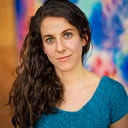21 Questions
NYC Mayoral Candidate Eric Adams Wants a New Food Policy
Brooklyn Borough President Eric Adams is vegan for his health and he’s encouraging New York to explore plant-based eating
If you need a little hope with your politics right now (and who doesn’t), I highly suggest keeping an eye on Brooklyn Borough President Eric Adams. Adams, who’s running for mayor of New York City, is a vegan on the forefront of enacting some of the most progressive new public health initiatives in the world. He’s out to prove that governments supporting plant-based policies have the potential to shift entire healthcare systems.
He’s managed to get Meatless Mondays and a ban on processed meat through in public schools across New York City. He created Bellevue hospital’s Plant-Based Lifestyle Medicine Program to help patients reverse chronic disease with plant-based nutrition — a pilot program that could be used as a model of showing how big an impact one’s diet has on healing. And Adams should know: he reversed his own severe diabetes and loss of eyesight by going plant-based. He even later got his elderly mother off insulin by encouraging her to do the same. For him, this is personal.
I spoke to Adams to hear how he’s taking care of himself during this time, and what the pandemic reveals about blindspots in the system.
1. How are you taking care of your mental and physical health with COVID?
Eric Adams: Meditating, exercising, eating well, and spending time with loved ones. Remembering that things will eventually calm down. I’m also grateful to be in a position to help; for instance, I’ve helped to distribute plant-based meals to those who are food insecure and to get food and medical equipment to frontline medical workers.
2. How is what’s happening now with this pandemic emblematic of larger issues around how we treat animals and our healthcare system?
The underlying disease causing this pandemic, like many novel diseases, has been linked to animal farming. Additionally, the death rates from coronavirus are much higher in those with pre-existing, diet-related conditions. Animal agriculture is an issue that requires immediate attention and upheaval, to decrease the prevalence of diet-related disease and to mitigate pandemic risk.
3. What do you say to people who think there are bigger problems in communities of color than addressing diet? How is this a social justice issue?
Racial justice encompasses food justice. For example, only 21.3% of African Americans consume fruits and vegetables 5 or more times per day. More than 48% of African American adults are obese. That’s appalling. If we want to achieve racial equity, food has to be part of the conversation.
4. Can you cite any examples in NYC of how food deserts and rates of illness disproportionally affect POC?
Food swamps, places with high concentrations of fast food and junk food, are good predictors of obesity rates. Additionally, low-income and racial-ethnic minorities are more likely to live near unhealthy food retailers. In East New York in Brooklyn, which is over 50% Black and over 35% Hispanic, is a prime example. It is the biggest food swamp in NYC, with 27 fast-food chains in one of its zip codes, and 14 in another.
5. OK, those were a bunch of heavy questions. Top 5 places to eat in Brooklyn?
When we emerge on the other side of this health crisis and restaurants re-open, I’ll be heading to Greedi Vegan, Bad Gyal Vegan, Riverdel, Perelandra, and Bunna Cafe, and of course, my kitchen.
6. What’s the short version of your vegan origin story?
Multiple doctors told me I’d have to be on medication for diabetes the rest of my life. I knew there had to be a more sustainable way to manage the problem. When I started eating plant-based, I reversed my Type 2 diabetes and regained sight in my left eye.
7. How has your switch affected your family?
My mother was diabetic for 15 years and on insulin for seven of them. Since she started eating a plant-based diet, she’s been insulin-free.
8. What are the top 3 most exciting things you’ve managed to do to further progress in this area of public health?
Meatless Mondays in NYC public schools, hospitals, and jails.
Bellevue hospital’s Plant-Based Lifestyle Medicine Program to help patients reverse their chronic disease with plant-based nutrition.
Passing a city resolution to ban processed meat in schools.
9. Why is it so hard to get school lunches and hospital meals to go plant-based? How does it have to do with lobbying from meat/dairy industries?
From the time we’re kids, we’re taught that meat, dairy, and eggs are normal, natural, and necessary. Doctors, teachers, and food providers are no exception. This has everything to do with lobbying. Industries frankly should not be allowed to use their money to leverage nutritional decisions when public health is on the line. I even testified in front of the USDA to alter their dietary guidelines to reflect the interests of the people, not the interests of big food companies.
10.What is the most vegan thing about you?
My fridge is always full of fresh fruits and veggies that are chopped and ready to be eaten.
11. What’s the most Brooklyn thing about you?
I don’t back down in the face of adversity.
12. What’s the most Brooklyn-vegan thing about you?
I host a quarterly Vegan and Veg-Curious Meetup for Brooklynites.
13. If you had to eat one thing every day for lunch, what would it be?
One of my immune-boosting grain and veggie bowls! I whip them up in the office kitchen most days of the week.
14. What do you say to people who say veganism is ‘a white and/or privileged’ thing?
A lifestyle that’s healthier for your body and for the earth is for everyone.
15. How do you think the vegan movement needs to adjust itself to better intersect with other social justice issues?
Recognizing that all social justice issues are intertwined and that the best diet for our bodies is the best diet for our planet. Experts in public health and environmental policy have different goals, but one of the most effective routes to both of their goals of promoting health and sustainability is more plant-based eating. There’s enormous potential for these groups to work together.
16.If you were trapped on a desert island with a pig, what would you do?
Give the pig a name! Probably “Brooklyn.”
17. What gives you the most hope?
The strength and perseverance of New Yorkers in the light of adversity, which we are seeing now more than ever.
18. What keeps you up at night?
Usually, I get good sleep because I exercise, eat well, and meditate regularly. I hope Brooklynites will join me in doing whatever we can to take care of ourselves right now!
19. What’s your biggest ‘guilty’ pleasure?
Single malt scotch.
20. What do you regard as the lowest depth of misery?
Watching a loved one continue to feed their health crisis.
21. Do you think NYC is ready for a vegan mayor? Just sayin’…I know a guy…
No doubt!

